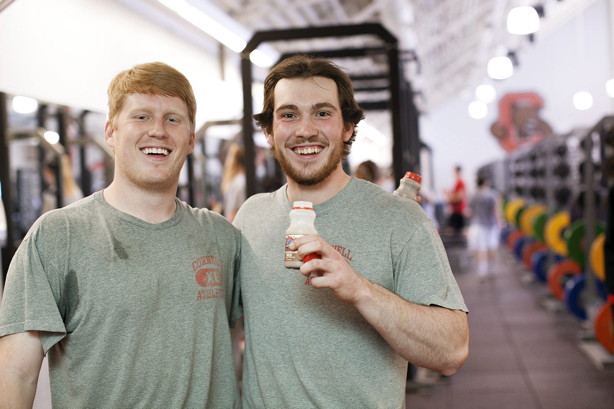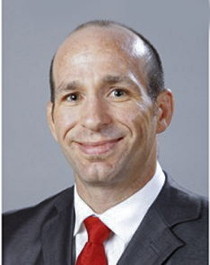LET'S GO BIG RED

Student athletes with chocolate milk. Photo: University Communications Marketing.
Refueling and empowering student-athletes
In a world promising that peak athleticism is just a supplement away, Cornell Athletics has gone back to basics to make sure Big Red athletes are ready to win. Conceived and led by coordinator of sports nutrition Clint Wattenberg '03, a former standout wrestler for Cornell, the Big Red Sports Nutrition program uses a "food first" fueling strategy to help student-athletes achieve their potential on the field and in the classroom.
The program doesn't focus on good foods versus bad foods, nor does it forbid athletes from indulging in a favorite treat. "We want to educate and empower our student-athletes to make healthy choices for themselves," says Wattenberg." This philosophy not only gives athletes agency over their health and development, it equips them with the knowledge to successfully navigate Cornell's dining halls.
After graduating from the College of Human Ecology with a bachelor's degree in nutrition, Wattenberg served as an assistant coach for the Big Red until 2006, when he stepped down to pursue his Olympic wrestling dreams (he finished third at the trials). He returned to the Hill, earning his registered dietician certification in 2010 while also doing nutritional consulting with Cornell teams.

Clint Wattenberg '03. Photo: Cornell University Athletics See larger image
As an athlete who competed in a sport that demands strength, speed, skill, agility, flexibility, resilience and mental quickness, Wattenberg has a perspective that few others can bring when it comes to fueling for athletic performance and the consequences of poor preparation.
He recalls one match during his junior season when as a result of suboptimal fueling he became mentally fatigued, abandoned his pre-match strategy and got reversed late to lose a close match to a rival from Harvard. "That season I also dealt with chronic injury and illness, problems exacerbated by my undernourished body struggling to heal from the strain of training and competing," he says.
Now Wattenberg strives to help student-athletes prepare themselves to do better than he did against his Harvard competitor. The primary nutritional issue confronted by young athletes is under-fueling and imbalanced fueling rather than excessive eating.
Says Wattenberg: "The most common issue we run into is that 75-90 percent of female athletes are not consuming enough carbohydrates. For both men and women, inadequate carb consumption affects everything - performance on game day, recovery, brain function and academic performance."
While the Big Red Sports Nutrition program connects many campus resources like Cornell Dining, the Cornell Healthy Eating Program and Gannett Health Services to support student-athletes, it shares a particularly delicious partnership with the Cornell Dairy. After each varsity team's training session in the Friedman Strength and Conditioning Center, team members enjoy a beverage that's nutritionally ideal for training recovery: chocolate milk.
"Lactose, the naturally occurring sugar in milk, is half glucose, which the body converts to glycogen and uses for energy during an athlete's strenuous activity," explains Wattenberg. "These milk sugars speed up glycogen synthesis to rebuild glycogen stores while the protein rebuilds damaged muscles so that our athletes can be ready to give it their all at their next practice. The sugar in low-fat chocolate milk creates the perfect ratio for this rapid replenishment."
Right now, all the milk consumed as part of the Big Red Refueling program comes from Cornell cows. This closed system food chain fits in nicely with the "local is better" environmental sustainability movement as well.
Molly Kate McDowell '03 is a program assistant and writer for Alumni Affairs and Development within the Department of Athletics and Physical Education.